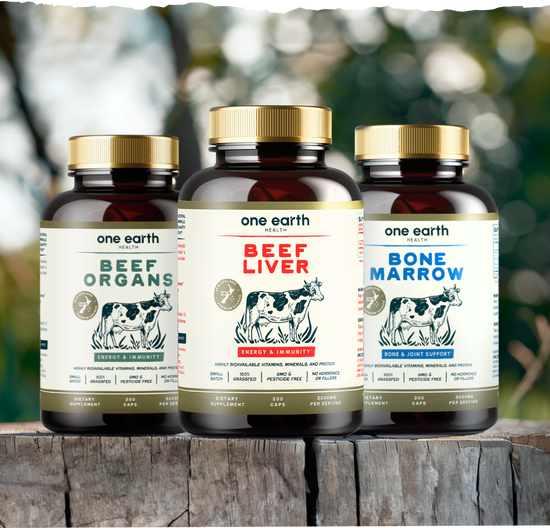
Grass Fed Beef Organ Supplements


BEEF ORGANS
- High Bioavailable Multivitamin
- Liver for General Health
- Kidney for Allergies
- Heart for Energy
- Spleen for High Iron Source
- Pancreas for Digestion Health


Premium Quality Nutrition From Nature
Our organ supplements are 100% sourced from regeneratively raised, grass-fed & finished cattle, and free from hormones, pesticides and artificial ingredients.
-
Hormone Free
-
Pesticide Free
-
GMP certified
-
GMO
Free -
100% grass Fed
-
Third Party Tested
Our Customers Love Our Products!







Educational Resources
April 12, 2024
The Ultimate Organ Meat Guide
Mar 27, 2024
Are Beef Organs Good for You?
Frequently Asked Questions
1Are beef organs keto-friendly?
Beef organs are very keto-friendly. They are low in carbohydrates and high in protein and healthy fats. They’re also bursting with essential nutrients your body needs to function optimally.
2What is the One Earth Health return policy?
If you’re not happy with our products, return them for a refund.
3Which is the most nutritious organ to eat?
The liver is the most nutritious organ, but that doesn’t mean you should stay away from the other organs. Each has a different nutrient profile; for example, the heart has vitamins that the liver doesn’t. Many of our customers opt for our Beef Organ Supplement, which contains beef liver, heart, kidney, pancreas, and spleen for maximum nutrient profile,
4How many calories are in beef organs?
Beef organs are fairly low-calorie, considering how much nutrition the contain. Here are approximate calorie values for 100 grams (3.5 ounces) of raw beef organs:
- Beef liver: 135 calories
- Beef heart: 112 calories
- Beef kidney: 99 calories
- Beef tongue: 284 calories
- Beef tripe (stomach): 94 calories
- Beef brain: 119 calories
- Beef pancreas or thymus: 180 calories
Cooking methods (or the addition of other ingredients) may alter these numbers a bit.
5What are the benefits of beef organs?
Beef organs give your body vital nutrients that the standard American diet lacks. They’re also high in protein and low in carbohydrates, giving you that extra protein boost. Here are twelve benefits of beef organs.
- Nutrient density: beef organs are packed with essential vitamins and minerals, often more so than muscle meat.
- Hormonal health support: Vitamin A from beef liver aids in the production of hormones like pregnenolone, progesterone, and DHEA.
- Bone health: Vitamin K2 in beef liver helps direct calcium into bones and away from arterial walls.
- Skin health: Vitamin A in liver acts as an antioxidant, protecting and supporting healthy skin cells.
- Brain health: organ meats contain choline and other nutrients important for optimal brain function and preventing neurodegenerative diseases.
- Detoxification support: molybdenum in beef liver supports the metabolism of sulfites and detoxification.
- Cardiovascular health: CoQ10, vitamin B12, and folate in organ meats support heart health and regulate homocysteine levels.
- Immune system support: zinc in organ meats is essential for proper immune system function.
- Muscle mass support: high-quality protein from organ meats helps build and retain muscle mass.
- Iron absorption: heme iron in organ meats is more easily absorbed by the body than non-heme iron from plant sources.
- Like-supports-like: nutrients in specific organ meats may benefit the corresponding organs in the human body.
- Environmental and economic benefits: using organ meats reduces waste and contributes to more sustainable food consumption.
6How much protein is in beef organs?
Beef organs deliver high-quality, complete protein, meaning they contain all the essential amino acids needed by the human body. The protein content in organ meats is comparable to, and in some cases higher than, that of steak.
Here are approximate protein values for 100 grams (3.5 ounces) of raw beef organs:
- Beef liver: 20.4 grams
- Beef heart: 17.7 grams
- Beef kidney: 17.4 grams
- Beef tongue: 16.3 grams
- Beef tripe (stomach): 12.1 grams
- Beef brain: 10.9 grams
- Beef sweetbreads (pancreas or thymus): 16.8 grams















